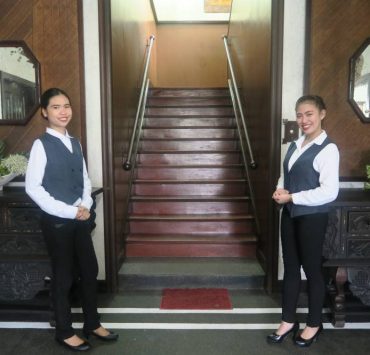INQskwela: 4-year media advocacy makes the grade
In short, this is where the “Inq” comes to the “skwela” quite literally. Under the program, a number of copies of the PDI—in print or digital formats—are set aside every day for distribution to partner schools in an arrangement financially supported by the host local government and formally approved by the Department of Education (DepEd).
For on the desk of a Social Studies teacher, the paper’s daily menu of news reports, features and commentaries can supply topics for homework, classroom discussions, quizzes or essay writing on current events, the who-what-where-when and the more insight-forming whys and hows, with details and nuances that can augment textbook learning, and with a depth of engagement no TikTok video can provide.
And so, during the debate, Kalagayan said, the results of the INQskwela program showed in the way ValMaSci students articulated their arguments and projected self-confidence. It was this “almost collegiate-level” performance that earned them the championship.
“There was such a big improvement. It’s not just in their knowledge and wisdom and the way they delivered, but also in their level of confidence. It all changed,” said Kalagayan, who is also the Inquirer vice president for corporate affairs. “Their command of English, their knowledge of the issues, the way they defended their position was really remarkable. I was so, so impressed.”
At the awards ceremony, Iver John de los Santos, the ValMaSci student who was named best speaker, remarked: ‘’I wish that the government will implement more programs strengthening media literacy in the country like what INQskwela is doing.’’
The students’ transformation provided an early glimpse of INQskwela’s goal being realized, just as it was envisioned when the program was launched in 2019: To spark in students the love of reading, grow their vocabulary, hone their communication and analytical skills, sow the seeds of leadership and social consciousness, inspire creativity, and (to quote Iver John) develop media literacy.
But behind such lofty goals, what gave urgency to the program, the very reason for its creation, was a rather sad, humbling reality.According to Kalagayan,
INQskwela was conceived as a reaction to the results of the 2018 Programme for International Student Assessment (Pisa) where the Philippines ranked lowest in reading comprehension out of 79 participating countries. This crushing embarrassment for the country’s education system was one of the Inquirer’s banner stories in 2019.
She thought: If media surveys and studies show that readers are increasingly yearning for “solutions journalism,” why not offer a solution initiated by the Inquirer itself?
Shrinking, warping space
As expected, it was not easy at the start: Print media in general was in a shrinking, warping space—challenged both financially as ad revenues thinned and readership leaned toward online platforms, and existentially as fake news, well-funded disinformation campaigns and the resulting trust issues hounded the profession itself.
These were just some of the hurdles faced by the team of Inquirer national sales manager Roy Mendiola as they began pitching the idea to local government and DepEd officials. Overcome those things and there were still legal and logistical matters to be ironed out.
As Mendiola put it, “we went the extra mile” to set up meetings with mayors and governors, attend council hearings (the funding depended on them), and make follow-ups—before agreements were signed.
Senior business development officer Akiko Quijano, the project lead in charge of dealing with the local officials, said the team often had to wait for several months to a year for allotments for INQskwela to be included in the annual budget of the partner province, city or municipality.
Before 2019 ended, INQskwela found its first four partner schools in Quezon City, Taguig City and Las Piñas City.
Disruption within a disruptionRecalling that period, Mendiola said: “I felt the importance of the newspaper and the appreciation people still have for having a physical hard copy. The kids, they were so hyped-up when the papers started arriving and also because INQskwela included activities like quiz bees and debates where reading the newspaper—even the back issues—gave them a competitive edge and that self-confidence from knowing the news.’’
And then came COVID.
Almost overnight, the pandemic further constricted the already downsized print industry, as the lockdowns that began in March 2020 drastically limited the movement of goods, including Manila-printed newspapers bound for the provinces. With the delivery restrictions and DepEd’s shift to online classes, INQskwela’s initial successes appeared short-lived.
But almost immediately a solution, a way to move forward, was found in another Inquirer initiative—a technological innovation that was introduced as an option for readers way back in 2012. An app that, social distancing-wise, suddenly became very apt.
INQskwela tapped the potential of Inquirer Plus, the mobile phone app containing the digital replica of the newspaper, one that comes with extra pages of exclusive content not found in the print version or on the Inquirer.net news website.
From thereon, even while work-from-home setups were still the norm, Kalagayan, Mendiola and the team began offering Inquirer Plus as a learning aid in lieu of the actual paper. As students and teachers were still holding classes online, it was an easy fit.
“We looked for a platform where the youths are and established that Inquirer Plus was that common ground,” said Mendiola. It bridged the “gap” between the students’ penchant for things digital like social media and the imperative to make them interested in the news.
By November 2023, the program had found more partners: the local governments of Valenzuela; Manila; Baguio City; San Manuel town in Tarlac; Victorias City in Negros Occidental; and Calumpit town in Bulacan. Contracts with three local government units (LGUs)—two Metro Manila cities and one northern province—were under review as of this writing.
In total, through INQskwela, Inquirer Plus has since established a subscriber base—and is part of the students’ lessons—in 120 public schools.
“My dream actually is to make this a program for LGUs north, south, east and west of the Philippines so we can see the impact and really be able to say that we helped students in improving their reading comprehension, one school at a time,” said Kalagayan. A way to do this in the future is also to allow students from INQskwela partner schools to contribute to the paper.
On a Singapore stage
But Kalagayan was, for a moment, probably not so fixated on numbers and academic metrics on the night of Oct. 20, when she was at the Orchard Hotel in Singapore with Sandy Prieto-Romualdez, president and CEO of the Inquirer Group of Companies.
That moment was when they were called to the stage to accept the Gold trophy at the 2023 WAN-Ifra Asian Media Awards, which recognized INQSkwela as the region’s “best in community service.”
WAN-Ifra stands for the World Association of Newspapers and the International Federation of Newspaper Publishers.
It covers a network of 3,000 news publishing companies and technology entrepreneurs, and draws its legitimacy from 60 member-publisher associations representing 18,000 publications in 120 countries.
“When we entered the project to the prestigious WAN-Ifra (for consideration), I had mixed feelings: I was confident that we have a solid advocacy that is very valuable and important for its stakeholders. And the Inquirer was very committed and dedicated to its goals of contributing to the improvement of education in our country. At the same time, I was doubtful if we can compete with equally good programs from other countries. Win or lose, I thought, at least we took the responsibility of making a difference.’’ “And then when we were announced the winner, I was extremely happy and proud that an international award-giving body recognized and validated the importance of our project. I am grateful to all our LGUs and DepEd partners who are helping us implement the program and sharing its mission.’’
Teacher Rhea
It was validation, indeed, that extended to the work done by the likes of Rhea Turla, a Social Studies teacher at Gen. Tiburcio De Leon National High School in Valenzuela.
In a Facebook post on Feb. 16, 2022, Turla announced the school’s partnership with INQskwela. Writing in Filipino, she said it was aimed at “making us aware of relevant news reports coming from the Inquirer.”
“Let us read them and then we’ll do short summaries of each item you’ve read.”
She has also created a separate Facebook page that serves as a chat group where her students can post and exchange views, and also answer short quizzes based on current events.
‘Common desire’
“INQskwela is unique in PDI’s portfolio of offerings because it does not require us to sell advertising or subscription. Instead, it requires us to go out, seek partners, and co-manage a program that runs for about 10 months,” said Inquirer president and chief executive officer, lawyer Rudyard Arbolado.
While each partner took a unique path during implementation, he said, “what was common was the desire to help the schoolchildren and make INQskwela work.”
“During the implementation stage, we took on the role of enablers, helped unlock existing capabilities, created linkages, filled in gaps, and incrementally fine-tuned or customized the program.”
Making such progress, Arbolado added, “We realized that INQskwela feels like a duty that we need to carry on. We are inspired by our mayors and councilors who selflessly devote their time, the teachers who unsurprisingly respond beyond their call of duty to devise ways to make INQskwela work, and the students who participate enthusiastically in the program.’’
“This gives us hope that we will be able to collectively build readers and informed citizens out of the next generation of Filipinos.” —With reports from Gabryelle Dumalag AND Renz Palalimpa INQ PROS, ANTIS—WINNERS ALL Members of the opposing teams who met in the finals of the first INQskwela student debate held in June 2022. Selected as best speaker was Iver John de los Santos (left photo, center) of Valenzuela Mathematics and Science High School. —PHOTOS BY EUGENE ARANETA

















